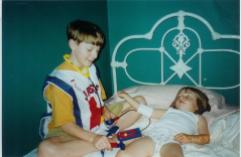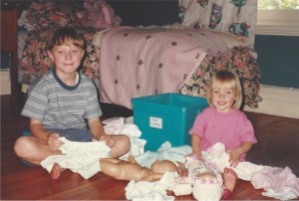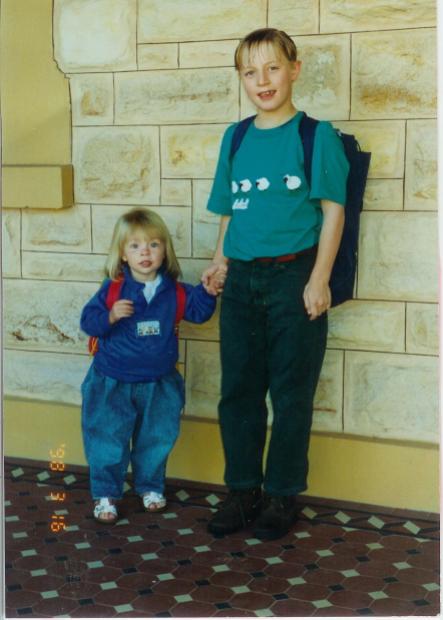EMOTIONAL WELL-BEING OF SIBLINGS
The emotional well-being of siblings of children with special needs is so important.
Often siblings are required to attend therapy sessions for a variety of reasons.
As part of my DIRFloortime™ training I was required to present a number of case studies within a like minded group of professionals from different countries (who were also undergoing the same training). One of my presentations was focussed on the pros and cons of siblings being present in therapy sessions. Some very interesting discussion was provoked amongst the group with many differing opinions. The group discussion was overseen by Faculty Members of DIRFloortime Institute. I am most grateful to have had this opportunity to analyse this very important issue which, I believe as Therapists, we may encounter on a regular basis. What I took away from this presentation and the discussions, and which I try to adhere to in my practice with families are the following
- There are times when siblings will be in sessions
- Beyond practical issues of a lack of child care – the parent may in fact wish the siblings present – they may be needing us to see what they experience on a daily basis. The parent may be equally wanting us to work with their child with special needs but also wanting the siblings to be able to play and be together in a way that is pleasurable and fun for all
- There are some very sensitive children with special needs that become overwhelmed by the presence of their siblings and where sessions may become so stressful that the atmosphere is not conducive to affecting positive change. With these children the aim would be to provide individual sessions until the child appears more ready for a sibling(s) being in the session
- If a sibling(s) are in attendance at therapy then I will treat each sibling equally with regards to their needs, feelings and ideas. The siblings will be scaffolded to be together around meaningful activities and play to all siblings. I will aim to increase or draw to their attention the other sibling’s actions, communicative intent and feelings. Parents are required to be actively involved and supportive of this premise.
Sibling sessions can be hard work but allows the Therapist to see the dynamics of sibling relationships, to fully understand and empathise with what families are experiencing often on a daily basis and how, if not going smoothly, this can impact on the parent’s feelings of being an adequate parent and that this may lead them to start to doubting their parenting skills. Parents understandably aim and desire harmony within the family unit.
Sibling sessions can tease out where the issues arise, and give opportunities to trial and model strategies for the parent(s) to assist with building a more harmonious and rich relationship between the siblings. As is appropriate, I can help each of the siblings better understand the needs and feelings of the other, and what they might be able to do or try not to do to support them during their play and interactions.
In my work with families I have often been involved with more than one child from same family. There are some families that have more than one child with special needs. This may mean that a sibling session might consist of two children from same family, each with special needs and their own unique profile.
MY THOUGHTS ON THE VALUE AND IMPORTANCE OF SIBLINGS TO EACH OTHER
From the moment siblings first see, hear, touch and/or hold each other there is a connection that can grow and blossom as each child develops, and are supported and guided by us, their parents.
The collage of photos that follows highlights just some of the special ways that siblings over time can
- be with each other
- give and receive or exchange affection, love, cuddles and hugs
- play with each other
- be there for each other when things may be a bit new or scary or a little overwhelming
- share and celebrate important occasions or events in life such as Christenings, Christmas, Birthdays and special family holidays
- support and/or sensitively encourage each other by holding the other’s hand or just being there when it might be a ‘first’ such as at the beach or a theme park or making a speech in front of others
- share time with the furry friends
For children who have siblings with special needs or fragile sensory profiles connecting with them may not be easy. They may feel that their sibling with special needs doesn’t like them or want to be with them or doesn’t like their ideas for play or that play has to happen in a particular way to accommodate to their individual needs. The child with special needs or who has a fragile sensory profile is probably wanting to be with their brother or sister but may be finding it really hard too due to their sensory profile and/or praxis challenges.
Each sibling needs to be supported to understand each other needs, emotions and how best they can be together – what might help their play and interactions and what might make things more difficult. They need our help to learn how to interpret each others actions or intent, and how to share their ideas and feelings better with each other. They need to learn how to read the other’s body language especially so if the child with special needs has limited language or no language. Over time and with our support sibling relationships can be strengthened and enriched so that each child feels connected with the other, valued, understood and engages in fun and meaningful play that they both gain pleasure from.





















